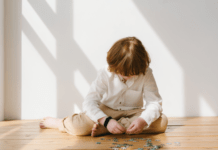While parenting is incredibly fulfilling, it can also knock us upside the head and often give us more than we can handle. When our twins were born, this is exactly what happened to my husband. As my husband was struggling with Paternal Postnatal Anxiety, I was unsure of how to navigate our new world, let alone support him in his new role of fatherhood. Weathering the storm of anxiety alongside my husband the last three years has taught me a few things that I think are incredibly helpful for anyone finding themselves in a similar situation.
Normalize the Feelings
- Normalize the feelings. These feelings of anxiety, irritability, and frustration are undoubtedly shared by so many people. Be brave enough to speak your truth. Normalizing feelings of paternal anxiety is far better than feeling shame.
- Once you understand your feelings, you are able to be a great role model for your kids. With this normalization, you are able to guide your kids through their feelings of anxiety and fear. You can help your child talk about their feelings and create coping strategies to use when they find themselves in those scary or overwhelming situations.

Acknowledge the Feelings
- When a wave of anxiety hits, recognize it and internalize it. When you have powered through that tough moment, stop and reflect on the circumstance. It is important to recognize that parenting is a huge responsibility, and because you are taking it seriously, you are going to feel these waves of anxiousness.
- During the intense days of raising infants, it is also essential to feel the feelings you are feeling and to not shut them down or dismiss them. Acknowledge that these feelings are real, but they do not define you or define your parenting.
Creating Balance
- Don’t be afraid to push back on norms of what balance looks like in new parents. For many years, the good parent was the selfless parent. In the past, your career, your partner, and your personal interests came second. Those thoughts do not reflect the parents of today.
- There is plenty of support around the idea that we are at our best when we have made ourselves a priority. It is important to make a commitment to your own wellness and well-being and to not feel guilty about this choice.
Social Media Trap
- Pressures of the Facebook family are real. When you are feeling insecure and overwhelmed, the last place you want to look is on social media where social norms and unrealistic parenting expectations are reinforced. Everyone is pretending that they have it together by creating cultivated images of vacations and happy babies. We begin to compare our struggles to those picture perfect families.
- I challenge your family to be raw, unscripted, and write your own social media story as opposed to meeting ridiculous standards. Be honest, be you, and be real about the struggle of parenthood. This helps normalize the feelings and language around anxiety.

Sharing Your Story
No one parenting experience is the same and throughout our short time as twin parents, we have gone through bouts of animosity towards our friends only caring for one child. Heck, we would have loved to parent one child in one stage of life at a time. Mothers and fathers of multiples suffer more mental health symptoms after delivery and up to one year later than do parents of singleton babies according to research presented at the annual meeting of European Society of Human Reproduction. There is a clear void in the amount of research and personal accounts surrounding the father’s mental health postpartum. My husband looked for books, articles, and other items to help him put a name to his ever increasing distress and there was a significant lack of information.
Today we are seeing the information available increase and it may be due to the recent handful of celebrity men (of which many are dads) who have made the headlines discussing their challenges of depression and anxiety. Let’s not let it stop there. The fathers who walk among us also have stories to tell about their individual experiences. It is through those common experiences–like my husband’s–that will help encourage conversations around the previously taboo topic of paternal/partner mental health.
If I can offer one critical piece of advice it would be; tell your doctor, get heard, and get help.
Has your family experienced paternal postnatal anxiety? Tell us your story. Read Part 1 of Becka’s family’s journey here.

















